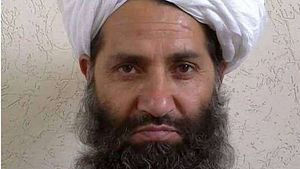The death of Mullah Mansour in Balochistan, Pakistan from a U.S. drone strike has propelled Haibatullah Akhundzada to the leadership of the Afghan Taliban. His elevation has been met with little criticism within the Taliban ranks. In fact, the leadership transition has been rather smooth, given that Akhundzada comes across as a respectable yet dogmatic and powerful figure; his ascendance sends ominous signs for the Quadrilateral Coordination Group’s (QCG) peace efforts. The fact that Taliban suicide bombers attacked a shuttle bus west of the Afghan capital Kabul, resulting in 11 casualties, may be a sign of things to come.
Akhundzada hails from the Noorzai Tribe in Kandahar, which has historically been the stronghold for the Taliban since the Afghan War started. He is believed to be around 60 years of age and a former deputy commander to Mullah Omar, who considered Akhundzada to be his ideological mentor. These facts give him considerable leverage amongst the rank and file of the Taliban, and help in uniting a group which has often witnessed fractious infighting.
With the QCG talks in jeopardy and the ability of each stakeholder—namely, the governments of Afghanistan, Pakistan, the United States, and China—to influence the Taliban becoming questionable, it is imperative to understand the implications of an ideological strongman at the center of the Taliban.
Firstly, Akhundzada was a former senior member of the Quetta Shura, a militant organization consisting of the center core of the Afghan Taliban’s leadership in Balochistan, Pakistan. He is familiar with how the leadership of his organization has worked in previous years and his association with the Quetta Shura has a key role to play in ensuring that the insurgency continues unabated. Retired General of the United States Army and former commander of Joint Special Operations Command Stanley A. McChrystal has claimed that are strong links between the Shura and the broader Afghan Taliban insurgency.
Akhundzada’s profile gains increased relevance given that he has served as the chief justice of the Taliban, presiding over different issues where his decrees were considered inviolable. As a legal scholar who is accepted across the ranks, his ability to wield influence will be unquestionable. This stands in stark contrast to certain factions of the Taliban that had considered Mullah Mansour’s appointment as inappropriate.
Akhundzada’s deputies include the notorious Sirajuddin Haqqani, the head of the Haqqani Network, which continues to be a major flashpoint between the United States and Pakistan. Additionally, Mullah Muhammad Yaqoob, Mullah Omar’s son, will serve as a deputy.
This elaborate profile hints at how the relentless struggle to get the Taliban to negotiate with the QCG could prove to be a cumbersome task. Akhundzada is planning on avenging the death of Mullah Mansour, which could mean that we will see a simultaneous surge in attacks in key Afghan cities and an expansion of the palpable trust deficit between both Pakistan and Afghanistan over the issue of cross-border terrorism. Finally, the United States’ ability to coax the group into accepting peace talks remains unchanged.
Since launching a years-long insurgency against what is viewed as the foreign occupation of Afghanistan, the current Afghan Taliban, under their new leader, pose a significant threat to sustainable peace in the region. Historically, few Taliban leaders have been ductile and given that the rank and file of the organization heavily draws from the ideological position of their leader, it is difficult to imagine prospects for reconciliation in the near future for all stakeholders who wish to see a stable Afghanistan and a stable region.
Hamzah Rifaat is a research associate at the Global Think Tank Network at the National University of Sciences and Technology and a 2016 Visiting Fellow at the Stimson Center.

































